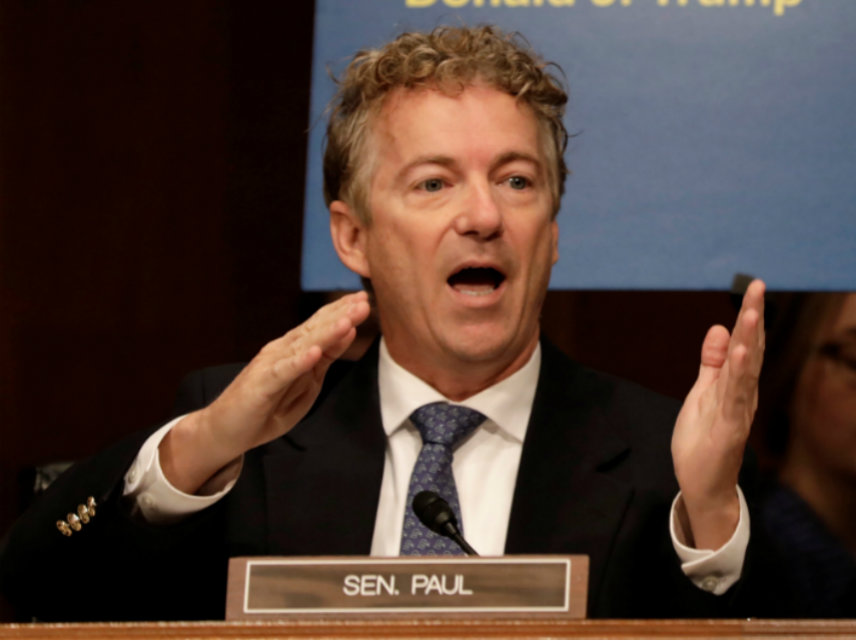Rand Paul's Plan to Eliminate Government Shutdowns: Automatic 1 Percent Budget Cuts
Because nothing in Washington is more terrifying than the prospect of a minuscule spending reduction

Government shutdowns are all the rage in Washington right now. We just had one a few weeks ago. Now, the president is already calling for another.
But while the prospect of shutting down the federal government might sound appealing, the reality of a government shutdown is expensive, wasteful, and therefore counterproductive to fiscal responsibility. The continuous threat of a government shutdown if Congress doesn't enact a budget (or at least a three-week-long continuing resolution) doesn't seem to be creating incentives for better fiscal stewardship. If anything, it's doing the opposite. Restarting the government on Jan. 23 after a three-day shutdown required Congress to authorize an additional $31 billion in borrowing.
Rather than continuing to careen from near-shutdown to actual shutdown and back again, Sen. Rand Paul (R-Ky.) wants to force Congress to pass a budget by imposing a penalty that's sure to give most of Washington nightmares: a 1 percent budget cut.
Under the terms of Paul's Government Shutdown Prevention Act, which he introduced last month, Congress would agree to ongoing continuing resolutions that would kick-in if a budget was not passed on time. The catch is that the automatic CR would come with an automatic, across-the-board cut of 1 percent for all government agencies. After 90 days, if there is no budget deal, funding would be reduced by another 1 percent.
"Around here, spending 1 percent less ought to be a enough of a punishment to get people to do their jobs and do appropriations on time," Paul said Tuesday during a hearing on his bill. "We know both sides don't want spending to go down. They're all for more spending."
Historically, Congress has relied heavily on continuing resolutions to keep the government operating in years when budgets are not passed. Since a full budget has been passed only four times in the past 40 years, CRs have become the rule rather than the exception. But as the January shutdown—which ended with the passage of a laughably short 3-week CR and no resolution on any of the underlying issues that caused the impasse in the first place—demonstrated, budgeting on a week-by-week basis is no way to govern.
The current CR will expire on February 8, at which point another government shutdown could occur. President Donald Trump on Tuesday encouraged Republican leaders in Congress to let the government shutdown again, rather than reaching a deal with Democrats on a pathway to citizenship for so-called "Dreamers," illegal immigrants who came to America as children and were given special protected status during the Obama administration. "I'd love to see a shutdown," Trump told reporters on Tuesday.
"Even if there isn't a shutdown and there's the possibility of a shutdown, there's a lot of planning and time that goes into that," said Heather Krause, director of strategic programs for the Government Accountability Office, a federal watchdog. A proposal like Paul's could help save time and money because government agencies would not have to plan for a possible shutdown. But automatic, across-the-board spending cuts like the 1 percent reduction Paul would include in the automatic CR can be problematic because it "equally cuts good and bad programs, so you're not shifting around to what's effective," she said.
Maya MacGuineas, president of the Committee for a Responsible Federal Budget, a fiscal policy think tank, supports Paul's proposal but suggested that some Republicans might prefer the automatic CR, with its budget cuts, instead of reaching a new budget deal.
"Would both sides dislike it enough? I think it's important to have something that would bring everyone to the table," she said.
But it's clear that Congress has little incentive to clean up its fiscal mess without a sword dangling over it's collective head. Even if a long-term CR or a budget deal is passed before the next shutdown on March 5, there seems to be no political will to tackle the really serious threats to America's long-term fiscal health—the national debt and entitlement costs chief among them—and leaders of both parties support the removal of what few spending limitations currently exist.
"There's like a handful of people who are for any restraints or budget caps at all anymore," says Paul. "And you're going to find out this week. They're going to blow through all the budgetary caps."


Show Comments (135)